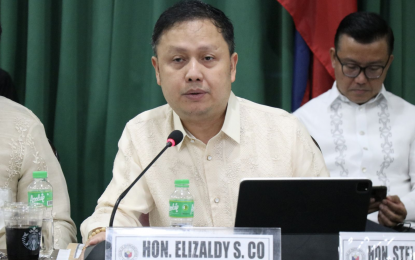
House Appropriations Committee Chairman Elizaldy Co (Photo courtesy of House Press and Public Affairs Bureau)
MANILA – The small committee tasked by the House of Representatives to amend the proposed PHP5.768-trillion national budget for 2024 on Tuesday announced that it removed a total of PHP1.23-billion in confidential funds of various civilian agencies.
House appropriations committee chair Elizaldy Co said the Office of the Vice President (OVP), Department of Education (DepEd), Department of Agriculture (DA), Department of Information and Communications Technology (DICT), and the Department of Foreign Affairs (DFA) will get "zero" confidential funds under the proposed spending plan for next year.
He said the PHP1.23 billion worth of confidential funds will be realigned to the front-line agencies in charge of ensuring national security and protecting the country's territorial rights in the West Philippine Sea.
Co noted that PHP300 million will be reallocated to the National Intelligence Coordinating Agency; PHP100 million to the National Security Council; PHP200 million to the Philippine Coast Guard for intelligence activities and ammunition; and PHP381.3 million to the Department of Transportation for the development or expansion of Pag-asa Island Airport.
Instead of confidential funds, Co said the civilian agencies will receive more funding for their maintenance and other operating expenses (MOOE), specifically: PHP30 million for the Bureau of Fisheries and Aquatic Resources (BFAR) under the DA; PHP25 million for DICT; PHP30 million for DFA; PHP150 million for DepEd's Government Assistance to Students and Teachers in Private Education (GASTPE).
The Office of the Ombudsman will also receive PHP50 million under their MOOE.
“Responding to the call of the times and the volatile situation in the West Philippine Sea, the small committee – as mandated by the House Plenary – has decided to realign CIFs (confidential and intelligence funds) to agencies whose principal mandate is to gather intelligence and ensure the protection of our national sovereignty,” Co said.
House appropriations committee senior vice chairperson Stella Quimbo said the decision was made considering the mandate of the agencies, arguing that confidential funds are for surveillance activities in the performance of the agency's principal functions.
Quimbo said the small committee also looked at the previous year’s budget and utilization levels before coming up with the decision.
Aside from the CIF realignment, Co said the House realigned a total of PHP194 billion to fight inflation and "invest in people and the country's future".
The small committee made the following changes to the proposed 2024 national budget to enhance food production and combat inflation, especially the high rice prices:
--PHP20 billion to DA for the rice subsidy program, to help sell rice at subsidized prices;
--PHP40 billion to the National Irrigation Administration (NIA) to install solar-driven irrigation pumps and --subsidize communal irrigation;
--PHP2 billion to the Philippine Coconut Authority for massive planting or replanting of seedlings;
--PHP1.5 billion for vaccines against the African swine fever (ASF); and
--PHP1 billion to the Philippine Fisheries Development Authority to build fishery and post-harvest facilities in Palawan and Kalayaan Group of Islands.
Co said funds were also allocated to the following to invest in people and the country's future: PHP43 billion to Department of Health for Medical Assistance to Indigent Patients (MAIP), legacy and specialty hospitals, cancer assistance, communicable diseases program, and health facility enhancement; PHP1 billion to UP Philippine General Hospital for MAIP; PHP35 billion for the Department of Social Welfare and Development’s (DSWD) Assistance to Individuals in Crisis Situations (AICS) and Sustainable Livelihood Program; PHP17.5-billion to the Department of Labor and Employment (DOLE) for the TUPAD program or Tulong Panghanapbuhay sa Ating Disadvantage/Displaced Workers/ Government Internship Program; PHP10.4 billion for the DOLE-Technical Education and Skills Development Authority (TESDA) Training for Work Scholarship Program; PHP17.1 billion for the Commission on Higher Education’s (CHED) Tertiary Education Subsidy and Tulong Dunong Program.
Meanwhile, the small committee dismissed as “fake news” the allegations circulating in social media that the chamber enjoys a PHP1.6-billion confidential fund.
“Wala pong confidential funds ang Congress. 'Yun pong sinasabing PHP1.6 billion ay (There are no confidential funds in Congress. The PHP1.6 billion they are referring to is under) Extraordinary Expenses,” Quimbo clarified during a press briefing.
“In short, that’s fake news,” interjected Co.
Quimbo said while the Extraordinary fund is lumped under the same heading with the Confidential and Intelligence Funds under the 2024 General Appropriations Act, it is subject to full scrutiny by the Commission on Audit, unlike the other two items.
“Yung (The) extra ordinary po ay (is) fully auditable, which is different from confidential [fund] at ang Congress ay wala po nung confidential (and Congress has no fund). Yung (The) extraordinary po ay kagaya ng (is similar to) expenses during calamities - that’s an example of an extraordinary expense,” she said.
Quimbo, however, clarified that confidential funds were retained in the budget of some agencies, like the Department of Justice or the Bureau of Customs, whose mandates required the performance of surveillance activities. (with a report from Jose Cielito Reganit/PNA)
